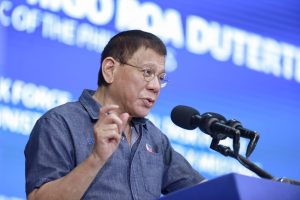A Philippine regulatory board has suspended former President Rodrigo Duterte’s TV show, reflecting a deepening discord within the ruling coalition. Supporters of the former president insist that the move is a violation of press freedom, but human rights advocates assert that those who make death threats on live TV should be held accountable.
The Movie and Television Review and Classification Board (MTRCB) issued a two-week suspension order against two Sonshine Media Network International (SMNI) programs, which included Duterte’s show, for airing profane language and alleged death threats against an opposition lawmaker. The controversial episode of the show aired in October and became the basis for a criminal complaint against Duterte, whose term as president ended in June 2022.
In the program, Duterte was ranting against Leftist lawmakers who questioned the confidential funds proposed by the office of his daughter, Vice President Sara Duterte, who also serves as education secretary. He condemned Congress as a “rotten institution” after the latter removed all confidential funds from civilian agencies. Bowing to public pressure, the younger Duterte eventually withdrew her proposal for the confidential funds.
Although the complaint against Duterte has yet to be resolved by the prosecutor’s office, the MTRCB issued its suspension order anyway. The MTRCB is an independent body, but its bold decision could indicate that government agencies are now ready to review the statements and actions of the former president. Duterte has long used his show to lambast and demonize critics and rival political personalities.
A few months ago, it would be unthinkable to hear comments, suggestions, and orders from officials that could potentially sever the alliance between the Dutertes and the government of President Ferdinand “Bongbong” Marcos Jr.
But the situation has evolved. In addition to the Congress realignment of confidential funds and the recent MTRCB decision, Marcos himself has publicly stated that his government is reconsidering the option of rejoining the International Criminal Court. The ICC is conducting a probe directed against Duterte for allegedly committing crimes against humanity concerning the bloody enforcement of his administration’s “war on drugs.”
Reacting to the MTRCB decision, Duterte’s allies warned that it could have a chilling effect on the press and those who are challenging the policies of the Marcos government. Ironically, the same people who cheered the closure of the country’s largest media station and those who echoed Duterte’s harassment and intimidation of the media when he was president are now raising the importance of upholding the freedom of expression.
Former Senator Leila de Lima, who was detained under the Duterte government, clarified in a thread posted on X (formerly Twitter) that “free speech must be distinguished from the peddling of fake news and incitement of people to criminal conduct.” She added that “government can’t be made powerless to penalize consummated violations in order to preclude recidivist and unapologetic repetition of illegal conduct on air.”
SMNI has been accused of being a platform for amplifying hate against communists, activists, and political forces that opposed Duterte’s repressive policies during his term. SMNI is allegedly owned by Apollo Carreon Quiboloy, a close ally of Duterte (though the network has denied that). The self-proclaimed “appointed son of God” is wanted by the U.S. Federal Bureau of Investigation for sexual and child trafficking charges.
In a statement, the National Union of Journalists of the Philippines reminded Duterte and SMNI that “freedom of expression and the freedom of the press are not blanket justifications for hate speech, vilification and threats.” Indeed, it is hypocritical for Duterte and SMNI to invoke free speech when they consistently tagged activists, human rights defenders, and even the media as enemies of the state, members of armed rebel groups, and terrorists.
Duterte will be off the air for two weeks, and the network hosting his show could face bigger sanctions. It may be a brief setback for the former president, but he can find other ways to broadcast his messages. As for the MTRCB decision and the spirited debates that followed it, Duterte’s camp must realize by now that it has lost solid backing from the ruling coalition. More importantly, the forces previously targeted by the former president’s verbal attacks are now availing all opportunities to pursue accountability and justice.
































